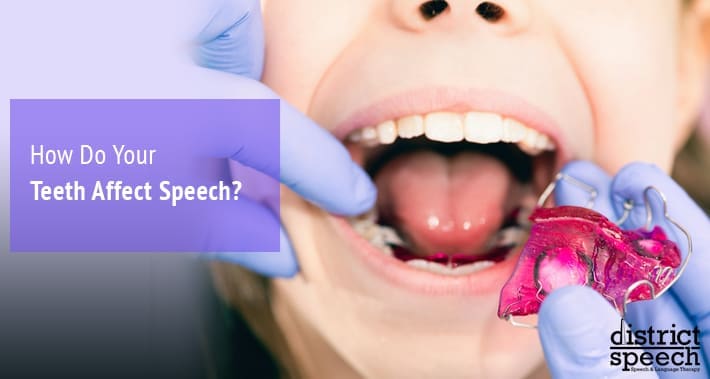
Your teeth and general dental health are intimately connected with your speech.
This is because your teeth are essential for speech and there are particular sounds you wouldn’t be able to make if you didn’t have them.
It’s especially important for your child’s development to make sure there are no dental issues that are not addressed.
The good news is that speech therapy is a great resource to use if your child is experiencing any speech challenges, even if they were caused by an underlying dental issue.
We’re District Speech, a clinic that offers speech therapy in DC, and teletherapy across the US.
If your child has trouble with their speech or language development, a pediatric speech therapist here at our clinic can help.
Now, let’s find out more how your teeth affect the quality of your speech.
How Can Dental Issues Affect Your Child’s Speech Development?
Your child’s entire mouth is essential for speech development.
This, of course, includes their teeth.
This also means that any dental issues can also affect your child’s speech development.
RELATED: Early Signs of Speech and Language Disorders
Their lips, tongue, and teeth all work together to form words by controlling the flow of air out of their mouth.
Sometimes, certain sounds rely on the striking of their tongue on their teeth to be voiced.
Try making ‘th’ or ‘b’ sounds, for example, and notice how your tongue and lips push against your teeth to do so.
This is why it’s important to get ahead of any potential dental issues in order to make sure your child’s speech develops at the right pace.
RELATED: MYTH: My Kid Doesn’t Need Speech Therapy. They Don’t Stutter Or Have A Lisp
What Speech And Language Disorders Are Linked With Dental Issues?
There are particular speech and language disorders linked with dental issues.
As your child grows, their dentist will typically screen for these issues during their routine visits.
Now, let’s go through some specific disorders linked with dental issues and understand their effect on your child’s teeth.
1. Cleft Lip And Cleft Palate
A cleft palate is a developmental issue that will typically emerge during the first few weeks of pregnancy.
What happens is that the tissue that forms the roof of your child’s mouth or lip doesn’t join correctly.
This typically requires surgery or corrective appliances to treat both the health issues and cosmetic issues associated with clefts.
RELATED: How Does Cleft Lip/Cleft Palate Affect Speech Development?
How It Affects Teeth
Clefts can impact the positioning, shape, size, and the number of teeth that develop in your child’s mouth.
Plus, consistent exposure to air as a result of the cleft can dry up their saliva, which allows bacteria to grow.
It’s also possible that even post surgery, your child may have an abnormal salivary gland which can affect their oral health.
How It Affects Speech Development
There are a variety of ways a cleft palate can affect speech development.
Plus, there is no way to anticipate exactly how, because the severity of their cleft doesn’t matter here.
Instead, it’s the type of cleft that matters.
If your child has a cleft that affects their soft palate, they may sound nasally because their soft palate doesn’t completely close.
RELATED: Speech Therapy Treatments For Hypernasality
If your child still has holes in their palate, they might have trouble making the sounds ‘s’, ‘z’, and ‘sh’.
As a result, your cleft palate speech therapist may include teaching your child how to cover the holes with their tongue in order to make those sounds.
Missing teeth as a result of their cleft could cause a difficulty in their ability to make the ‘f’, ‘v’, or ‘th’ sounds.
2. Tongue Thrust
Tongue thrust is when your tongue presses too far forward in your mouth, which causes an abnormal orthodontic condition called ‘open bite’.
It is commonly found in children and can be caused by:
- Allergies
- Tongue tie
- Poor swallowing habits
Babies typically have tongue thrust, which they then grow out of as their swallowing and speaking patterns change.
But, prolonged use of nipples and pacifiers can also cause this condition which persists into childhood.
RELATED: Symptoms Of Tongue Thrust
How It Affects Teeth
Tongue thrust can cause malformed teeth if left untreated.
This is because their tongue pushes against the back of the teeth, which over time causes their front teeth to move outward.
Over time, a gap or open bite between their middle top and bottom teeth can develop.
How It Affects Speech Development
Tongue thrust can lead to a lisp over certain sounds if left untreated.
As a result, tongue thrust speech therapy can include speech therapy for lisp.
It can also cause their facial shape to elongate and their tongue to consistently protrude from between their teeth.
3. Tongue Tie And Lip Tie
Tongue tie is a condition that restricts your tongue’s range of motion that is present at birth.
There is usually a short, thick band of tissue that connects your tongue tip to the floor of your mouth.
It can affect the way you eat, speak, and swallow if not addressed.
Lip tie, on the other hand, is a condition where your upper lip is attached to your gums, which prevents lip movement and can interfere with breastfeeding.
It is also present at birth.
Both conditions require a simple, surgical procedure to correct.
How It Affects Teeth
If your child’s tongue is restricted by a tongue tie, it may be difficult for them to reach into the different areas of their mouth to clear food debris after eating.
This can impact their dental hygiene and may cause tooth decay.
It’s also not uncommon for children with tongue tie to develop gaps in their front teeth.
How It Affects Speech
Tongue tie can cause issues with the creation of several different speech sounds.
Try making ‘d’, ‘l’, ‘r’, ‘s’, ‘t’, ‘z’, or ‘th’ and notice the role both your teeth and your tongue movement play in those sounds.
Tongue tie can make it difficult to make these sounds, and so speech therapy for tongue tie often involves teaching your child how to more effectively create these sounds.

How Can A Speech Therapist Help?
Most dental issues require a dentist or orthodontist to address the root cause.
A speech therapist’s role is in helping with the speech challenges that may result.
RELATED: Signs Your Child Should See A Speech Therapist
Even once solved, your child won’t automatically correct themselves without being shown how.
For this reason, speech therapy early intervention is key because this will allow less time for bad speech habits to get ingrained.
This will also make it easier for your child to break those bad habits and improve their speech development.
It’s also worth noting that pediatric speech therapy will heavily involve you as their parent.
This is because exercises need to happen at home, as well as during speech therapy.
The goal is to have your child complete an evidenced based program that encompasses all aspects of their home and school life.
This will give them the greatest chances to succeed in their speech therapy and stimulate their development.
RELATED: Home Speech Therapy Exercises You Can Do With Your Children
Book Your Appointment With District Speech Today
Are you looking for experienced pediatric speech therapists who are committed to improving your child’s development?
If so, District Speech is here to help.
Book your appointment with District Speech to day.
1300 I St NW, Suite 400 E,
Washington, DC 20005
- https://g.page/districtspeech
District Speech and Language Therapy specializes in speech therapy, physical therapy, and occupational therapy solutions, for both children and adults, in the Washington D.C and the Arlington Virginia areas.